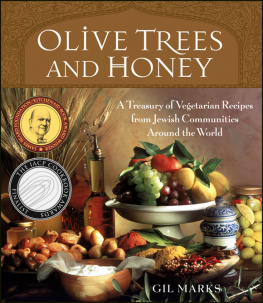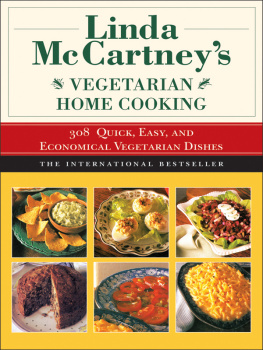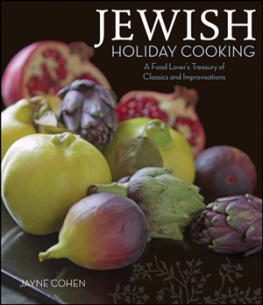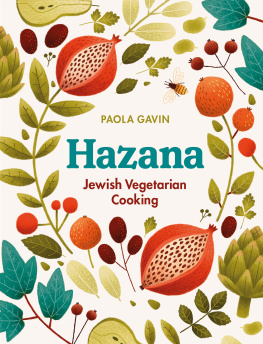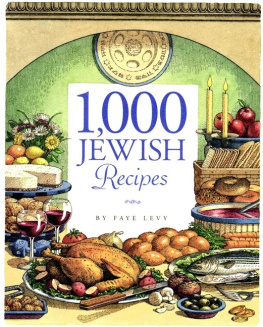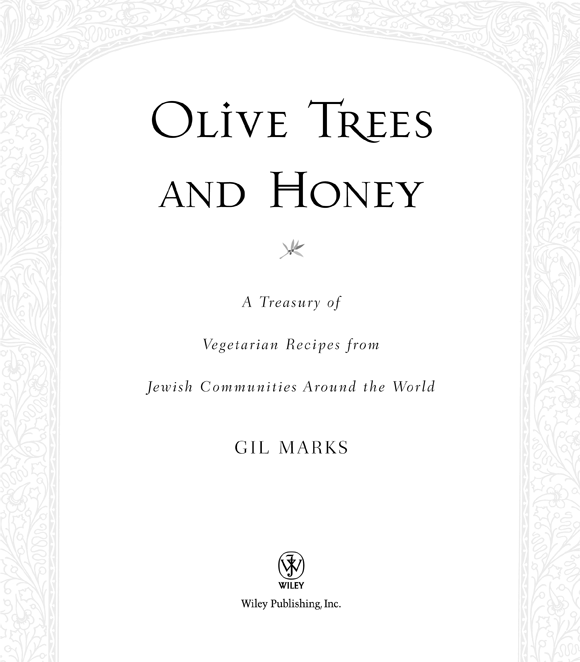Copyright 2005 by Gil Marks
Maps by Roberta Stockwell
Published by Wiley Publishing, Inc., Hoboken, NJ
Published simultaneously in Canada
No part of this publication may be reproduced, stored in a retrieval system or transmitted in any form or by any means, electronic, mechanical, photocopying, recording, scanning or otherwise, except as permitted under Sections 107 or 108 of the 1976 United States Copyright Act, without either the prior written permission of the Publisher, or authorization through payment of the appropriate per-copy fee to the Copyright Clearance Center, 222 Rosewood Drive, Danvers, MA 01923, (978) 750-8400, fax (978) 646-8600 or on the web at www.copyright.com. Requests to the Publisher for permission should be addressed to the Permissions Department, John Wiley & Sons, Inc., 111 River Street, Hoboken, NJ 07030, (201) 748-6011, fax (201) 748 6008.
Limit of Liability/Disclaimer of Warranty: While the publisher and author have used their best efforts in preparing this book, they make no representations or warranties with respect to the accuracy or completeness of the contents of this book and specifically disclaim any implied warranties of merchantability or fitness for a particular purpose. No warranty may be created or extended by sales representatives or written sales materials. The advice and strategies contained herein may not be suitable for your situation. You should consult with a professional where appropriate. Neither the publisher nor author shall be liable for any loss of profit or any other commercial damages, including but not limited to special, incidental, consequential, or other damages.
For general information on our other products and services, please contact our Customer Care Department within the United States at 800-762-2974, outside the United States at (317) 572-3993 or fax (317) 572-4002.
Wiley also publishes its books in a variety of electronic formats. Some content that appears in print may not be available in electronic books. For more information about Wiley products, visit our web site at www.wiley.com.
Library of Congress Cataloging-in-Publication Data
Marks, Gil.
Olive trees and honey : a treasury of vegetarian recipes from Jewish communities around the world / by Gil Marks.
p. cm.
Includes index.
ISBN-13: 978-0-7645-4413-2 (hardcover : alk. paper)
ISBN-10: 0-7645-4413-6 (hardcover : alk. paper)
1. Vegetarian cookery. 2. Cookery, Jewish. 3. Cookery, International. I. Title.
TX837.M34 2004
641.5636089924dc222004012272
Printed in the United States of America
10 9 8 7 6 5 4
To my parents,
Beverly and Harold Marks,
for their love and support

Other Books By Gil Marks
Encyclopedia of Jewish Food
The World of Jewish Cooking
The World of Jewish Desserts
The World of Jewish Entertaining
ACKNOWLEDGMENTS

I owe an enormous debt to many people, both in America and abroad. Among those who shared their recipes, ideas, and time with me are Adam and Annie Anik, Suzi Brozman, Dalia Carmel and Hebert Goldstein, Michelle Comet, Lillian Cooper, Rae Dayan, Louise Defez, Poopa Dweck, Julie Goell, Liselotte Gorlin, Phyllis Koegel, Emile de Vidas Levy, Adina Mishkoff, June and Peter Olster, Faye Reichwald, Aaron Rubin, Raquel Sanchez, Stanley Allan Sherman, Mathilde Turiel, Eva Weiss, and Dr. Cynthia and David Zimm.
Very special thanks go to my familyBeverly and Harold Marks, Rabbi William and Sharon Altshul, Efrat Zipporah and Elli Schorr, Moshe Raphael Schorr, Adira Tova Schorr, Meira Bracha Schorr, Anat and Asher Yaakov Altshul, Ora Rivka and Naftali Derovan, Elchanan Matanya Derovan, Esther Chana Altshul, Aryeh Dov Altshul, Eliana Bracha Altshul, Rabbi Jeffrey and Shari Marks, Shlomo Yosef Marks, Miriam Malka Marks, Efrayim Marks, Tehila Marks, Ashira Marks, Rivka Leah Marks, Rabbi Arthur and Aviva Marks, Rivka Marks, Moshe Marks, Leah Marks, Shmuel Marks, Ahron Marks, Yeshai Marks, Yakov Marks, Daniel Marks, Devora Marks, Rachel Marks, Rabbi Labby and Carol Vegh, Chana Tzipora Vegh, Shifra Miriam Vegh, Avrohom Boruch Vegh, Elisheva Vegh, Yisroel Vegh, Adina Rivka Vegh, Moshe Yakov Vegh, Akiva Shabsi Vegh, and Menachem Meir Veghwho bore the brunt of my culinary development and experimentation.
Very special thanks and appreciation go to my friend and agent Rita Rosenkranz, for her perseverance and counsel.
I want to express my gratitude to all the people at Wiley involved in the production of this book. Most especially I want to thank and acknowledge my editor, Linda Ingroia, and assistant editor, Adam Kowit, for their encouragement, insight, and advice. They were instrumental in transforming a dream into reality. Thank you also to Monique Calello, the production editor; Ava Wilder, the production assistant; Richard Oriolo and Holly Wittenberg, the designers; Roberta Stockwell, who created the wonderful maps; and Gypsy Lovett and Michele Sewell, the publicity managers.
INTRODUCTION

F ood, viewed in Judaism as a source of both physical and spiritual sustenance, is an integral part of the Jewish religion, associated with many rituals and every life-cycle event. It is essential to the observation of the Sabbath and the Jewish festivals, establishing and enhancing the spirit of the day. In addition, the strict segregation of meat and dairy under the dietary laws meant that through history cooks needed to develop a repertoire of nonmeat dishes. In light of this, it is hardly surprising that the many Jewish laws and customs led to the evolution of a wealth of vegetarian recipes, both plain and sophisticated, for every occasion. Whether a person seeks vegetarian dishes for health, philosophical, or gastronomical reasons, Jewish cuisine offers many examples. Yet there exists precious little material exploring traditional Jewish fare.
In Olive Trees and Honey , I offer a collection of traditional vegetarian dishes gathered from Jewish communities across the globe. The purpose of this book is not to support or dispute the practice of vegetarianism, but rather to offer an assortment of exciting and possibly unfamiliar recipes that would enliven and enrich any diet. It also provides insights into the origin and evolution of specific vegetarian dishes, as well as the life and history of the communities that created them.
If we are what we eat, then Jews are the accumulation of at least thirty-five hundred years of history. In each of the geographical areas in which Jews found themselves, the local climate, vegetation, traditions, and events transformed their culinary habits. Over the centuries, Jewish customs and cooking continued to evolve, taking on distinct nuances in disparate places and creating diverse cultural communities. As a result, there is no one kind of Jewish cooking, but rather a mosaic of cuisines from Jewish cultural communities of varying sizes and development, each possessing its own unique history and customs. Groups of Jews from Asia, although a very diverse array, are frequently subsumed under the catchall designation Mizrachim (Easterners), which incorporates those from Yemen, Iran (Persia), Georgia, Armenia, Uzbekistan/Bukhara, Azerbaijan, Afghanistan, Kurdistan, and India (Bombay, Cochin, and Calcutta). In addition, separate Jewish communities emerged and survived for millennia in Italy and Ethiopia. The two largest Jewish cultural communities are Ashkenazim and Sephardim.

